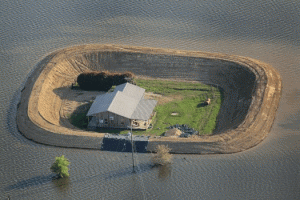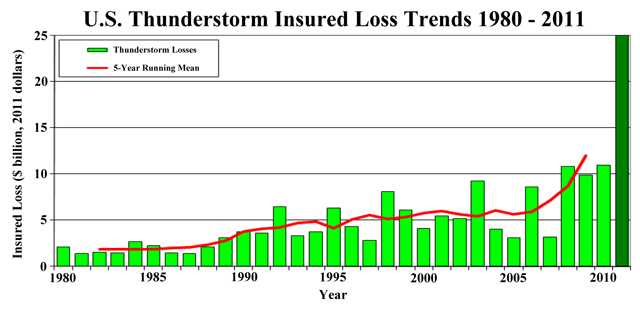'The Evidence Shows Greenhouse Gases Are Linked To The Rise Of Billion-Dollar Weather Disasters...'

Last year, America suffered historic weather calamities: disastrous tornadoes, severe floods, extended drought, record-breaking snowfall, raging wildfires, etc. Federal agencies say $52 billion in property loss was inflicted, and more than 1,000 Americans died in weather ravages….
Scientists say the violent weather is solid evidence that fossil fuel fumes are girdling Planet Earth with greenhouse gases that produce global warming and climate change. Warmer air holds more moisture, producing more extreme storms.
A new study by Yale and George Mason university pollsters found that 70 percent of Americans now believe that “global warming is affecting the weather.” Yale professor Anthony Laiserowitz commented: “People are starting to connect the dots.”
This topic has special resonance in West Virginia, a fossil fuel treasure trove. And what happens here has a special impact on the future of the planet. Pollution controls seeking to reduce global warming are sure to impose tighter restrictions on coal and natural gas. West Virginia’s energy should not be squandered on a shortsighted attempt to protect the status quo, or to discredit science in the public’s eyes, or to vilify the Obama administration’s very reasonable proposal that new coal-fired power plants be required to limit their greenhouse gas emissions. West Virginia should put its energy into getting people ready to work in a world after coal.
Conservatives doubt that climate change is real, or that fossil fumes cause it. Republicans in some state legislatures are passing laws to let public school science teachers dispute both evolution and global warming.
They are leading people down a wrong and dangerous road….

Insured losses due to thunderstorms and tornadoes in the U.S. in 2011 dollars. Data and image from Property Claims Service, Munich Re.
Low-tech cleantech solutions won’t revolutionize the energy industry. They won’t make venture capitalists rich. And they won’t, by themselves, lead to the 80 percent reduction in greenhouse-gas emissions by 2050 that many climate scientists suggest we need. But they can offset a lot of carbon in the short run. [Bloomberg]
The strange thing is, experts say, that despite the politics, Romney and Obama have essentially the same position on offshore drilling. [Los Angeles Times]
Solar energy is seen as one way to save in Connecticut, where residential electricity costs were the third highest in the United States in 2010, exceeded only by Hawaii and New York, according to the U.S. Department of Energy. [Businessweek]
Scientists have identified thousands of sites in the Arctic where methane that has been stored for many millennia is bubbling into the atmosphere. [BBC]
It seems to have gone virtually unnoticed, but the world leaders at the weekend’s G8 summit look as if they have taken the biggest step in years in tackling climate change. And it’s quite apart from anything to do with carbon dioxide. [The Telegraph]
The administration of New Jersey Gov. Chris Christie is taking a hard line on power plant pollution near his state’s border, backing an Environmental Protection Agency order for strict reductions in sulfur dioxide emissions from a GenOn-owned plant in eastern Pennsylvania. [Politico]
You can return to the main Market News page, or press the Back button on your browser.

